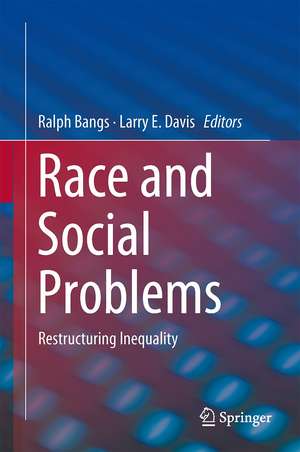Race and Social Problems: Restructuring Inequality
Editat de Ralph Bangs, Larry E. Davisen Limba Engleză Hardback – 19 sep 2014
Race and Social Problems takes the long view of this state of affairs, offering both multi-level analysis and a practical blueprint for social justice. It begins by explaining how race-related social problems have changed over the decades. This volume identifies factors contributing to their persistence in this century, most notably the central role of economic disparities in exacerbating related social problems and replicating them for future generations. The chapters expand on this knowledge by detailing innovative and successful strategies for addressing aspects of six major areas of inequality:
- Poverty: challenging standard American concepts of poverty.
- Education: approaches toward closing the achievement gap.
- Intergroup relations: enhancing race dialogues.
- Family and lifespan: programs targeting families, youth, and elderly.
- Criminal justice: reducing incarceration and increasing public safety.
- Health and mental health: promoting positive outcomes.
| Toate formatele și edițiile | Preț | Express |
|---|---|---|
| Paperback (1) | 640.37 lei 6-8 săpt. | |
| Springer – 10 sep 2016 | 640.37 lei 6-8 săpt. | |
| Hardback (1) | 646.62 lei 6-8 săpt. | |
| Springer – 19 sep 2014 | 646.62 lei 6-8 săpt. |
Preț: 646.62 lei
Preț vechi: 760.73 lei
-15% Nou
Puncte Express: 970
Preț estimativ în valută:
123.73€ • 129.53$ • 102.38£
123.73€ • 129.53$ • 102.38£
Carte tipărită la comandă
Livrare economică 05-19 aprilie
Preluare comenzi: 021 569.72.76
Specificații
ISBN-13: 9781493908622
ISBN-10: 1493908626
Pagini: 296
Ilustrații: VIII, 287 p. 27 illus., 22 illus. in color.
Dimensiuni: 155 x 235 x 22 mm
Greutate: 0.59 kg
Ediția:2015
Editura: Springer
Colecția Springer
Locul publicării:New York, NY, United States
ISBN-10: 1493908626
Pagini: 296
Ilustrații: VIII, 287 p. 27 illus., 22 illus. in color.
Dimensiuni: 155 x 235 x 22 mm
Greutate: 0.59 kg
Ediția:2015
Editura: Springer
Colecția Springer
Locul publicării:New York, NY, United States
Public țintă
ResearchCuprins
Part I: Introduction.- America's Racial Realities.- Do Current Race and Ethnicity Concepts Reflect a Changing America?.- Intergroup Dialogue: Race Still Matters.- Part II: Economics.- Wealth Building in Communities of Color.- Recent Employment Trends Among Black Men and Their Policy Implications.- Challenging the Conventional Understanding of American Poverty.- Part III: Education.- Interventions to Address Racial/Ethnic Disparities in School Discipline: Can Systems Reform be Race-Neutral?.- Exploring, Understanding and Closing the Achievement Gap(s): Efforts from Harlem to Homewood.- High School Quality and Race Differences in College Achievement.- Part IV: Special Topics: Family Matters: Strengthening the Fabric of Minority Families.- Aging and Health in Mexican Americans: Selected Findings from the Hispanic EPESE.- Racial Disproportionality in Prison.- Resetting Race.- Part V: Health: Disparities in Health Care for Minorities: An Ecological Perspective.- Considering the Role of Social Determinants of Health in Black-White Breast Cancer Disparities.- Understanding and Addressing Racial/Ethnic Disparities in Obesity.- Mental Health Indicators for African American Males.
Notă biografică
Dr. Bangs is Associate Director of the Center on Race and Social Problems in the School of Social Work at the University of Pittsburgh. He is also Associate Editor of the journal, Race and Social Problems, which was started in 2009 and is published by Springer Press. He is co-editor of the forthcoming books, The Race in America Conference Commemorative Book and The Race in America Handbook. Further, he is co-editor of the book, The State of Black Youth in Pittsburgh (1999), and co-editor of 2002 and 2011 reports on African American Health in Allegheny County. He is co-author or author of many other reports on race in the Pittsburgh region, including Place-Based College Scholarships: An Analysis of Merit Aid and Universal Programs (2011) and Black-White Benchmarks Reports (1994 and 2004). In 1997 the YWCA of Pittsburgh gave Dr. Bangs a Racial Justice Award for his Black-White Benchmarks report. Dr. Bangs was also recognized as “Best Researcher” by In Pittsburgh newspaper in March 2000. Dr. Bangs received a doctorate from the University of Pittsburgh in Public Policy Research and Analysis and a Masters of Public Administration from Ohio State University.
Dr. Larry E. Davis is Dean of the School of Social Work at the University of Pittsburgh, where he is the Donald M. Henderson Professor and Director of the Center on Race and Social Problems. Dr. Davis came to the University of Pittsburgh in the fall of 2001. He had been a faculty member at the George Warren Brown School of Social Work at Washington University in St. Louis, Missouri since 1977, where he was a Professor of Social Work and Psychology and the holder of the E. Desmond Lee Chair in Ethnic and Racial Diversity. Dr. Davis received his PhD from the University of Michigan’s dual-degree program in social work and psychology in 1977. He holds a bachelor’s degree in psychology from Michigan State University and a Master's in social work and a Master's in psychology from the Universityof Michigan. His professional interests include interracial group dynamics, the impact of race, gender, and class on interpersonal interactions, African American family formation, and youth. He has received research funding from sources such as the National Science Foundation, the National Institute of Health, and National Institute of Mental Health. Dr. Davis is the recipient of the Chancellor's 2007 Affirmative Action Award.
Dr. Larry E. Davis is Dean of the School of Social Work at the University of Pittsburgh, where he is the Donald M. Henderson Professor and Director of the Center on Race and Social Problems. Dr. Davis came to the University of Pittsburgh in the fall of 2001. He had been a faculty member at the George Warren Brown School of Social Work at Washington University in St. Louis, Missouri since 1977, where he was a Professor of Social Work and Psychology and the holder of the E. Desmond Lee Chair in Ethnic and Racial Diversity. Dr. Davis received his PhD from the University of Michigan’s dual-degree program in social work and psychology in 1977. He holds a bachelor’s degree in psychology from Michigan State University and a Master's in social work and a Master's in psychology from the Universityof Michigan. His professional interests include interracial group dynamics, the impact of race, gender, and class on interpersonal interactions, African American family formation, and youth. He has received research funding from sources such as the National Science Foundation, the National Institute of Health, and National Institute of Mental Health. Dr. Davis is the recipient of the Chancellor's 2007 Affirmative Action Award.
Textul de pe ultima copertă
As much as Americans believe in the promise of an egalitarian, color-blind society, the reality is far from that ideal. People of color consistently lag behind their white counterparts in key quality-of-life areas. Despite many significant gains, widespread structural inequalities continue to exist--and thrive.
Race and Social Problems takes the long view of this state of affairs, offering both multi-level analysis and a practical blueprint for social justice. It begins by explaining how race-related social problems have changed over the decades. This volume identifies factors contributing to their persistence in this century, most notably the central role of economic disparities in exacerbating related social problems and replicating them for future generations. The chapters expand on this knowledge by detailing innovative and successful strategies for addressing aspects of six major areas of inequality:
Race and Social Problems takes the long view of this state of affairs, offering both multi-level analysis and a practical blueprint for social justice. It begins by explaining how race-related social problems have changed over the decades. This volume identifies factors contributing to their persistence in this century, most notably the central role of economic disparities in exacerbating related social problems and replicating them for future generations. The chapters expand on this knowledge by detailing innovative and successful strategies for addressing aspects of six major areas of inequality:
- Poverty: challenging standard American concepts of poverty.
- Education: approaches toward closing the achievement gap.
- Intergroup relations: enhancing race dialogues.
- Family and lifespan: programs targeting families, youth, and elderly.
- Criminal justice: reducing incarceration and increasing public safety.
- Health and mental health: promoting positive outcomes.
Caracteristici
Defines race in social terms Covers a range of areas with up-to-date research Chapter authors are noted authorities
















